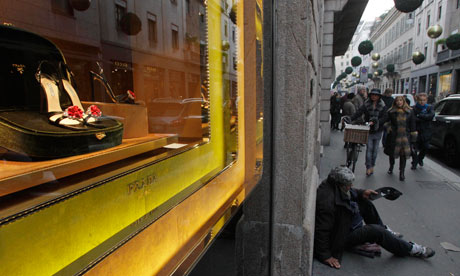悲慘世界

【Susan Boyle-悲慘世界-I dream a dream】
【Susan Boyle 悲惨世界 Les Miserables 我曾有夢】

【2011-02-01 英國歌唱達人-Shaun Smith - Ain't No Sunshine】
【2011-05-21 英國星光大道 Jamie Pugh - Bring Him Home】
http://www.appledaily.com.tw/appledaily/article/headline/20120911/34500176
辣蘋果:台灣的悲慘世界(余艾苔)
2012年09月11日
馬英九連任就職已滿一百天,人民生活卻愈來愈困頓,當初說好的財經內閣要拼經濟,卻似乎讓人有一籌莫展之嘆!青年學子畢業找不到工作,中年人面臨失業危機,即使到了老年,也可能貧病纏身,很難樂活退休。當你的人生從年輕到老都充滿痛苦時,國家還有希望嗎?
上述這些情況不是一種假設極端現象,它在我們日常生活中上演。昨天一個求職網站針對職場新鮮人進行調查,結果發現近五成新鮮人花了三個月都找不到工作,就算找到工作,起薪也很低,之前報導過,起薪退回了十七年前的水準,但為了生活,還是得咬牙撐下去。
財經閣員早該換人
薪水倒退嚕,物價卻是漲價後再也回不去了,在這種情況下,叫這些大學畢業生如何談理想抱負?溫飽都很難了。
昨天還有一個調查顯示,高達九成的民眾認為經濟不好,這個比率太驚人了,幾乎等於全國百姓對經濟都很悲觀,而經濟部長施顏祥的滿意度也好不到哪裡去,這個警訊,政府不能輕忽。
當今非太平盛世,馬英九不能再用太平官,不能適應亂局的閣員還是趁早換了吧!
http://udn.com/NEWS/WORLD/WOR2/7354776.shtml
義大利「白寡婦」 泣訴歐債自殺潮
【聯合報╱編譯李京倫/報導】 2012.09.11 03:18 am
半年前,一個被大筆欠稅逼得走投無路的義大利泥水匠寫了一封遺書給結褵27年的妻子,然後在北部城市波隆那的稅務機關外,開瓦斯引火自焚,9天後不治。
他的遺孀提茲安娜說:「他是個好人,只不過沒有機會還完債,如果稅務人員肯給他機會的話一定還,不過每次還的錢沒法像他們要求的那麼誇張,因為他每月根本賺不到兩萬歐元(約台幣75萬元)。」CNN報導,提茲安娜是最近成立的「白寡婦」團體一員。經濟困頓逼得許多男人走上絕路,他們的遺孀便組成這個團體。「白寡婦」可說是各國厲行撙節的後果。
去年上半年,希臘的自殺率比前年暴增逾40%。現在義大利借貸成本飆升,不得不撙節開支,希臘撙節造成的自殺潮如今在義大利重演。義大利人幾十年來習慣逃稅,現在國家沒錢,稅務人員查稅也變得嚴格起來。
【2012/09/11 聯合報】
http://www.guardian.co.uk/world/2012/apr/30/italian-women-husbands-recession-march
Italian women whose husbands killed themselves in recession stage march
'White widows' will march in Bologna to draw attention to plight of families hit by unemployment and bankruptcy

A man begs in Milan. Newspapers have contrasted the luxury lifestyles of some politicians with the struggle faced by many ordinary Italians. Photograph: Luca Bruno/AP
Dozens of Italian women widowed when their husbands killed themselves because of the recession will march on Friday to bring attention to their plight.
The grieving wives and family members of more than 25 businessmen who have committed suicide because of financial woes linked to Italy's economic crisis – dubbed the "white widows" by the Italian media – will be led by Tiziana Marrone, the unemployed wife of a craftsman who set fire to himself outside the tax office in Bologna last month, dying nine days later.
Organisers of Friday's march, including the Italian Women's Union, say they will carry white flags from the Bologna hospital where Giuseppe Campaniello was treated to the charred black spot of pavement outside the Equitalia tax office where he self-immolated.
Marrone has become the public face of Italy's private pain after giving several interviews and reading out her husband's suicide note on national television. It said: "Dear love, I am here crying. This morning I left a bit early, I wanted to wake you, say goodbye, but you were sleeping so well I was afraid to wake you. Today is an ugly day. I ask forgiveness from everyone. In a few months you will become an aunt, and I hope everything goes well, so Danilo and Sara are happy, and you too. A kiss to you all. I love you, Giuseppe."
According to the EURES social research institute, suicides have been on the rise in Italy since 2008, with at least two per day on average in 2010, when 362 unemployed people and 336 entrepreneurs killed themselves. In 2011, a record 11,615 Italian businesses closed their doors. In 2012, at least 25 and as many as 70 suicides have so far been linked to Italy's economic troubles, especially prevalent in the industrial north and the construction industry.
The widows say there is too little dialogue and not enough state support for families that have fallen into despair over unemployment, bankruptcies and loan defaults.
"My battle is not just mine, it is of all the Italians who find themselves in my condition, and most of all of the widows of those families, who don't know where to turn to pay all these debts," Marrone said.
In the last month, the suicide stories have piled up. In Florence, a 65-year-old businessman hanged himself in his warehouse, while an estate agent in Naples jumped from his eighth-floor apartment building. Out-of-work craftsmen shot themselves in Rome, Catania and Sardinia. The latest funeral was on Sunday, when Sardinians mourned yet another businessman who killed himself after no longer being able to employ his two children.
While Friday's march is apolitical, it reflects a growing populist discord – a mix of disgust, despair and frustration many Italians feel toward their politicians. One popular restaurant in Le Marche hung out a "no politicians allowed" sign this week.
The newspapers have been saturated in recent weeks with stories of corrupt politicians earning exorbitant salaries and living luxury lifestyles, while many families struggle with high unemployment and a raft of new taxes and austerity measures being implemented by the technocratic government headed by Mario Monti. "The government must do something to change the laws, because it is not right what is happening in Italy," Marrone said. "On the one side we have people who steal and remain free … on the other side there are those who set themselves on fire because they don't know how to pay their tax debts."
http://udn.com/NEWS/WORLD/WOR2/7349762.shtml
http://www.bloomberg.com/news/2012-09-07/jobless-greeks-resolved-to-work-clean-toilets-in-sweden.html
http://udn.com/NEWS/WORLD/WOR2/7349762.shtml
失業率24%! 希臘人被迫出國打工
聯合晚報╱編譯彭淮棟/綜合報導】 2012.09.08 02:56 pm
卡拉查里歐在希臘當藥廠推銷員17年,穿西裝,開公司車子,有個開支帳戶,周末帶女兒遊玩,和父母喝咖啡聊天。如今他在瑞典小學拖地板擦玻璃。
卡拉查里歐把六歲的女兒留在雅典給父母照顧,成為被希臘24%失業率逼出國的無數希臘人之一。「我得想辦法活下去。這裡日子困難,非常困難,我寧願留在希臘,可是那裡沒工作。」
希臘已經第五年衰退,今年經濟預估將和去年一樣萎縮6.9%。總人口1080萬,失業人數自2008年以來增加兩倍,達122萬。
烏拉妮亞失掉紡織廠的工作,2010年和丈夫離開有房有車的舒適日子,到瑞典求生。「在希臘,我們沒有未來,」她說。「這裡還可以抱點希望,我可能沒希望,我48了,但孩子可能有希望。」
卡拉查里歐才40歲,日益稀疏的黑髮已點點飛霜,雙手塵泥,一身牛仔褲和工作靴。西裝和領帶留在家鄉。
他3月來到瑞典,在住滿其他移民的社區裡,他那個房間月租4500瑞幣 (台幣二萬元),沒有瓦斯爐,他只有一個盤子。廚房裡有電視機,他從來沒看。
他起初清潔出租房間,辛苦、寂寞,沒有午餐時間,第一周沒薪水(說他是試用),第二周結束,沒有電話叫他繼續做。
在希臘,他月薪2500到3000歐元之間 (台幣9萬5000至11萬元),現在每小時賺80瑞幣,以每周工作40小時計,月入約1907美元(台幣5萬7000元)。
他在斯德哥爾摩北部一所小學工作,一大早5點鐘起床,搭地鐵上工,清洗好幾十扇窗戶,做得腰酸肩痛。洗完窗戶,清潔地板,口袋裡一把工刮刀,隨時要括黏在地上的口香糖。
「40歲的人,要接受人生就是這樣,非常難受,」他說。
【2012/09/08 聯合晚報】
http://www.bloomberg.com/news/2012-09-07/jobless-greeks-resolved-to-work-clean-toilets-in-sweden.html
Jobless Greeks Resolved to Work Clean Toilets in Sweden
By Oliver Staley - Sep 7, 2012 9:51 PM GMT+0800
As a pharmaceutical salesman in Greece for 17 years, Tilemachos Karachalios wore a suit, drove a company car and had an expense account. He now mops schools in Sweden, forced from his home by Greece’s economic crisis.
Enlarge image
Greek Exile Tilemachos Karachalios Casper Hedberg/Bloomberg
Tilemachos Karachalios, a Greek former pharmaceutical salesman, looks at photographs of his family in his rented apartment in the Rissne district of Stockholm, Sweden, on Aug. 5, 2012. Karachalios is one of thousands fleeing Greece's record 23 percent unemployment and austerity measures that threaten to undermine growth.
Tilemachos Karachalios, a Greek former pharmaceutical salesman, looks at photographs of his family in his rented apartment in the Rissne district of Stockholm, Sweden, on Aug. 5, 2012. Karachalios is one of thousands fleeing Greece's record 23 percent unemployment and austerity measures that threaten to undermine growth. Photographer: Casper Hedberg/Bloomberg
Enlarge image
Greek Exile Tilemachos Karachalios Casper Hedberg/Bloomberg
Tilemachos Karachalios, a Greek former pharmaceutical salesman, with coffee in his rented apartment in the Rissne district of Stockholm, Sweden, on Aug. 5, 2012.
Tilemachos Karachalios, a Greek former pharmaceutical salesman, with coffee in his rented apartment in the Rissne district of Stockholm, Sweden, on Aug. 5, 2012. Photographer: Casper Hedberg/Bloomberg
Enlarge image
Greek Exile Tilemachos Karachalios Casper Hedberg/Bloomberg
Former pharmaceutical salesman Tilemachos Karachalios is one of thousands fleeing Greece’s record 24 percent unemployment and austerity measures in Greece.
Former pharmaceutical salesman Tilemachos Karachalios is one of thousands fleeing Greece’s record 24 percent unemployment and austerity measures in Greece. Photographer: Casper Hedberg/Bloomberg
.“It was a very good job,” said Karachalios, 40, of his former life. “Now I clean Swedish s---.”
Karachalios, who left behind his 6-year-old daughter to be raised by his parents, is one of thousands fleeing Greece’s record 24 percent unemployment and austerity measures that threaten to undermine growth. The number of Greeks seeking permission to settle in Sweden, where there are more jobs and a stable economy, almost doubled to 1,093 last year from 2010, and is on pace to increase again this year.
“I’m trying to survive,” Karachalios said in an interview in Stockholm. “It’s difficult here, very difficult. I would prefer to stay in Greece. But we don’t have jobs.”
Greece is in its fifth year of recession, with the economy expected to contract 6.9 percent this year, the same as in 2011, according to the Athens-based Foundation for Economic and Industrial Research. Since 2008, the number of jobless has more than tripled to a record 1.22 million as of June, out of a total population of 10.8 million.
“In Greece, there was no future,” said Ourania Michtopoulou, who moved with her husband to Sweden in 2010 after both lost textile industry jobs in Thessaloniki, where they had a comfortable life with a house and car. “Here, I can hope for something good to happen. Maybe not for me -- I’m 48 -- but maybe for my children.”
‘Go Home’
Their family now crams into a small apartment, while her husband, Nikos, works for a landscaper and her teenage children struggle with Swedish lessons.
“It was not easy for them,” she said. “My daughter said lots of times, ‘I hate Sweden -- I want to go home.’”
Karachalios began his career in pharmaceutical sales after his mandatory military service, working at three different companies in the southern city of Patras. He married a Chinese woman he met at the 2004 Athens Olympics, had a daughter, and divorced.
“You can plan, you can organize, you can make plans for 10 years, 20 years, but you don’t know what life brings,” he said.
An intense man with flecks of gray in his thinning black hair, Karachalios said he has lost 20 to 30 pounds since moving to Sweden. His hands are stained with grime. Instead of the suits and ties he once wore, he now dresses in jeans and work boots. His suits remain in Greece.
Lost Job
In Homer’s Odyssey, Telemachus is the son of Odysseus, a Greek hero who spent 10 years struggling to return home from the Trojan War. Karachalios was named after a great-uncle who was a favorite of his parents.
Karachalios’s troubles began in early 2010 when the Greek government, which provides health care, forced drugmakers to cut their prices by as much as 27 percent. To reduce costs, his then-employer PharmaSwiss fired him and two other salesmen, leaving his former supervisor to manage the accounts, he said. Karachalios searched for jobs and eventually spent two months in 2011 as a telemarketer in Athens. He quit after not being paid. An ill-fated attempt to start a retirement home cost him months of work and most of his savings.
Determined to move, Karachalios considered Australia before rejecting the immigration process as too expensive. He had a friend in Sweden, had visited before and knew its reputation.
“I knew they were very organized,” he said. “Everyone pays their taxes and it’s fair. There is no cheating.”
Single Dish
Karachalios arrived in March. His friend helped him find a room to rent and he pays 4,500 Swedish krona ($670) a month for a room in a quiet apartment complex that houses other immigrants, many from the Middle East.
His studio has no stove or oven, just a hot plate and microwave. He has a single dish, and when he has a guest, he eats out of a plastic container that used to hold feta cheese. A tiny Greek flag is taped to the wall. The room came with a television though Karachalios said he never watches. In the evenings, if he has the energy, he studies Swedish.
Because of his background in health care, Karachalios at first applied for jobs caring for the elderly. He was rejected without an interview because he didn’t speak Swedish.
To find a job, he began knocking on doors of restaurants and janitorial companies, and eventually found a position cleaning rental houses. It was hard, lonely work that didn’t allow a break for lunch, he said. His first week wasn’t paid because he was told he was being trained. After his second week, when he was paid for only 32 hours instead of the 40 he said he worked, he wasn’t called back.
Frugal Living
In July, he found work with a cleaning contractor run by another Greek. Although the hours are long and the work difficult, Karachalios said he is at least treated fairly.
In Greece, Karachalios was paid between 2,500 and 3,000 euros ($3,143-$3,772) a month, after taxes. In Stockholm, he makes 80 krona an hour. Based on a 40-hour work week, that equals about $1,907 a month.
“I was doing something more glamorous but I don’t mind this work,” he said. “I feel alive again. When you are unemployed too long, it’s very hard. I was angry all the time.”
Karachalios wasn’t paid until mid-August for work he did in July. In the meanwhile, he lives frugally, saving half-smoked cigarettes while he waits for his parents to wire money. He also worries about finding another job, which will be necessary once school resumes and the cleaning contract ends. If he can’t find a permanent job in Stockholm, he said he may move with his daughter to Shanghai, where his ex-wife lives.
“I don’t have anywhere else to go and work, and it would be helpful for my daughter,” he said.
Little Contact
There are now 1.4 million foreign-born people in Sweden, or 15 percent of the population, an increase from virtually none at the end of World War II. While Sweden prides itself on being a tolerant and progressive nation, an anti-immigration party drew 5.7 percent of the vote in 2010, the most ever, said Klas Borell, a Swedish professor of sociology.
At the schools Karachalios cleans, he has little contact with Swedes. The principal of one school in Uppsala, Andreas Kembler, said that while he doesn’t know the janitors by name, he makes a point to say hello to them in the hall. The students have been learning about the crisis in Greece, and about the implications of unemployment, Kembler said.
When told about Karachalios, Kembler says he is troubled that Greeks are forced from their homes in pursuit of work.
Wrong Reasons
“I can see, now that our economy is strong and theirs is weak, that it may be natural to move somewhere where there are still jobs,” Kembler said. “I also feel that the move should be for the right reasons, positive reasons, and that in his case there must have been a certain amount of duress that he was under, which of course isn’t an appealing thought that he was forced to move away from his family.”
Karachalios wakes at 5 a.m. with the sun already up because of the long Swedish summer days. He checks Facebook on his phone for news from Greece and takes the subway one stop to Rinkeby, a gritty working-class neighborhood. Near the station is a parking lot where people without homes sleep in their cars, leaving their shoes and bottles of water outside the doors.
At a litter-strewn gas station just off the highway, Karachalios waits for a van to pick him up. Other migrant workers, headed for other destinations, wait nearby. He smiles with anticipation: once he’s in the van he’ll borrow a co- worker’s iPhone to talk with his daughter, Katerina, on Skype.
Katerina’s Day
When they talk, it’s about her day in Greece: her trip to the beach with her grandparents, what she’ll have for breakfast. He wants to bring her to Stockholm but won’t until he has a stable job and living situation.
Talking with Katerina is a highlight of his day and he was crushed when his laptop stopped working and he couldn’t Skype with her on her birthday. Now, he checks in with his parents by calling on his mobile phone and hanging up, and they do the same, so they don’t have to pay for the call.
After a cigarette with his co-workers -- all immigrants from Greece -- Karachalios piles into the van for the 45-minute drive to the outskirts of Uppsala, a small city north of Stockholm. Today’s job is to finish cleaning the elementary school they began working on yesterday. They start at 7:30 a.m. and work 2 1/2 hours before breaking. For lunch, they share their food, with Karachalios bringing fried meatballs for the group.
Family Distressed
Karachalios is charged with cleaning the dozens of double- paned windows, which takes its toll on his back and shoulders. On other days, he cleans floors. In his pocket, he carries a razor blade for scraping the gum off linoleum.
His decision to leave Greece has been hard on his family back home, sister Nikki Karachalios said. Just one year older, she and her husband lived in the same apartment complex as Karachalios and their daughters are the same age.
“As a family, we have always been very close and now it’s difficult,” she said in a phone interview.
Their father, who had been hospitalized with a respiratory condition, is particularly distressed, Nikki Karachalios said. Still, they all understand why he left, she said.
“He was very unhappy,” she said. “He had no money, he was completely broke, he had loans for the house he couldn’t pay. There was nothing for him here, he was staying home for days because he had no place to go.”
‘Serious Decision’
Two years ago, Nikki Karachalios lost her own job working for a French construction company when a planned highway from Patras to Athens was canceled. Her husband, a commercial sailor, is also without work and does odd jobs for his brother.
The family is supported by her father’s 700 euro-a-month social security check, which buys groceries and little else. She expects that payment to be reduced as the government makes a new round of cuts. She is considering moving to Stockholm, as well.
“By the end of the year I will have to make a serious decision about the future of my family,” she said.
In Sweden, struggling to make sense of Greece’s decline, Tilemachos Karachalios suggests a conspiracy by Germany and France to economically cripple the country in order to seize its Aegean oil reserves. He’s also bitter about comments made by former Greek Prime Minister George Papandreou, who said in interviews abroad in 2009 that corruption and tax evasion were to blame for Greece’s problems.
“Who, me?” Karachalios said. “I’m not lazy. I didn’t steal from the government. I was honest and they made me like this, to come here.”
Unpredictable Future
What gnaws at him is the uncertainty that comes from not having a stable job or predictable future.
“I’m tired of all this,” he said. “I want to close my eyes and wake up in 10 years and not have to worry.”
Migrants to Sweden from within the European Union are free to look for work and can settle if they can provide for themselves or have family there. Although the unemployment rate is 7 percent, finding work can be difficult if new arrivals don’t speak Swedish, said Arto Moksunen, director of Crossroads, a nonprofit group in Stockholm that has provided assistance to 3,000 migrants since March 2011.
Konstantinos Fraggidis, who is the president of a Greek cultural association in Stockholm, said he fields 10 to 15 e- mails a day from Greeks asking about working and living conditions in Sweden.
“You can read how desperate these young people are,” Fraggidis said. “Here suddenly, you see them by themselves trying to leave Greece, not only their village but to leave the country. They have taken the big step and it is very traumatic.”
Always Tired
As his day ends, Karachalios returns to his room, cooks a simple meal and goes to bed. After five months in Stockholm, his life has settled into a routine. On weekends, he cleans his apartment, does his laundry and sleeps. He is almost always tired and has few people to talk to. He contrasts that to his life in Greece, where he spent weekends chatting with his parents over coffee and taking his daughter to the playground.
Even with his contempt of Greek politicians, Karachalios is proud of his country. The Stockholm subway isn’t as good as Athens’s metro, he says. Swedes aren’t as tidy as Greeks.
“I want to die in Greece,” Karachalios said. “I want to leave my bones in Greece.”
The resumption of school this month means the end of the cleaning company’s contract. Karachalios found another temporary cleaning job and also lined up part-time work delivering newspapers that will pay 7,000 krona ($1,038) a month. That job requires a car, and he spent what little money he had -- about 3,000 krona -- buying one. Two miles after getting behind the wheel, the car broke down, leaving Karachalios despondent and considering a return to Greece.
“To get to be 40 years old, it’s very hard to accept that your life is going to be like this,” Karachalios said.
To contact the reporter on this story: Oliver Staley in London at ostaley@bloomberg.net
To contact the editor responsible for this story: Lisa Wolfson at lwolfson@bloomberg.net
http://www.ttv.com.tw/101/04/1010405/101040549357041.htm

http://www.nownews.com/2012/04/05/334-2801506.htm


http://www.appledaily.com.tw/appledaily/article/international/20120406/34140532

http://pets.nownews.com/2010/05/09/11507-2601103.htm

http://210.59.230.13/magazine/report/po/new7/8772/134677440094194001001.htm
【政治事】馬英九百日成績單「死當」罷免馬總統倒數計時中……
- 新新聞 | 2012-09-05 00:00:00 林瑩秋
經濟成長率八次下修,保二破功;油價屢創歷史新高;年輕人失業率直逼十三%,七月消費者物價指數四年新高,加上林益世、黃季敏等案爆發,馬政府清廉度落入「貪腐」等級。老百姓快忍不下去了,這樣的「董事長」和經營團隊,應該要下台負責!
如果把台灣當作一家公司,那麼馬英九總統是「董事長」,行政院長陳?是「總經理」,行政院內閣就是公司的「經營團隊」,人民就是這家公司的股東。
八月二十七日,是馬英九總統第二任期上任第一百天。正因為是第二任了,沒有連任壓力,理應更能施展手腳,做一些福國利民的事,好讓後人評價他的歷史定位。不過,他交出一張很不光彩的百日成績單。
GDP連八修 景氣九個藍燈
首先,是主計總處今年第八度下修台灣的經濟成長率(GDP)到一.六六%,不僅保二破功,甚至只有第一次預估值四.五八%的三分之一強,平均每個月下修一次經濟成長率,也讓掌管全國統計數據的主計總處瀕臨「信用破產」。
如果有一家公司頻頻下修財報,八個月就下修八次,難道這家公司的董事長、總經理和經營團隊,不必對股東和投資大眾有所說明,「何以致此?」
其次,是過去九個月景氣訊號燈連續亮出九個藍燈,藍燈代表「衰退」,創下台灣史上第二長的衰退期。
可是經濟部長施顏祥直到現在才「醒來」想到要出國招商,過去他該做的事沒做,反倒是由時任經建會主委的劉憶如代勞;而主管全國短中長期經建計畫的經建會主委尹啟銘,則在主持行政院財經議題研討會記者會時心不在焉,心心念念要趕赴國民黨投中常委選舉一票。他們難道對連續九個藍燈無感?
物價漲失業增 百姓日子難過
第三,是八月二十七日凌晨起,九八無鉛汽油每公升售價三八.三元、九五無鉛三六.三元、柴油三三.七元,全部再創歷史新高價格,對民生經濟影響極大。
但媒體也爆出另一個不為人知的數據:中油運油成本近年來暴跌七成,與四年前最高點相較,中油一年可省九十億元。中油是否如實反映成本在售價上,還是暗槓?政府特派爆料天王、前立委邱毅到中油擔任官股董事,如果連邱毅都查不出個所以然來,民眾也只能咬緊牙根忍下去。
第四,十五到二十四歲的年輕人失業率直逼一三%,創歷史新高,平均薪資也只有二十一K,倒退回十七年前的薪資水準。因為政府教育與產業政策走錯方向,讓「青貧族」成為失落的一代。
第五,七月消費者物價指數年增率二.四六%,已創近四年新高水準,而八月有蘇拉、天秤雙颱來襲,電價調漲,油價又創新高,八月的消費者物價指數可能再破七月紀錄。
第六,根據財政部公布七月底的國債數字,中央政府一年以上債務餘額是四兆八七四五億元,短期債務餘額一五○○億元,合計長短期債務餘額五兆○二四五億元,平均每人負債二十一‧六萬元,雖然比四月每人負債二十二‧五萬元的「歷史新高」稍減一點,但仍落在歷史高檔區。
政府舉債攀高 每人背九十萬
何況財政部還示警,到今年年底,中央政府一年以上債務餘額將首度突破五兆元,逼近舉債上限四○%,這還未計入「潛藏負債」。
主計總處則公布各級政府的潛藏債務有近十五兆元,非營業基金舉債七千多億,地方政府長短期債務八千多億,政府總負債約二十一‧五兆元,平均每人負債超過九十萬元。
除了上述這些可以「量化」的經濟、財政數字讓人民苦不堪言,馬英九成績單上還有一些不能量化的醜陋,說是操行成績也好,是清廉指標也罷,這是他一路走來引以為傲的從政特色,如今卻「逆轟高灰」。
前消防署長黃季敏雖已轉往台塑集團任職,但他被監控長達三年,從住家和辦公處所被搜出十九條金條,都是用人民的救命錢換來的,他從「救災英雄」變「貪汙狗熊」,馬政府毫無知覺?行政院副院長江宜樺聽聞此訊居然回說,自己擔任內政部長期間就有所聽聞,這番話說得如此事不關己,也算是很離奇了。
回溯四年前八八風災時,黃季敏在防災指揮中心昏倒那一幕,現在看來猶如馬政府清廉招牌倒塌一般,讓馬政府自林益世收賄案後清廉再罩陰霾,「貪腐」問題也像地雷般逐一爆開,不知還有多少未爆彈?
年初馬英九勝選後,他帶領的執政團隊表現就愈來愈荒腔走板,感覺他很想改革、有所作為,但手腦不一,還呈現嚴重四肢癱瘓的「失能」狀態,民不聊生,抗議也無效,大家早已忍很久了。在五二○就職前,雖然有很多人想要「罷免馬英九」,但受限於他第一任期剩下時間不多,罷免程序緩不濟急,第二任期開始後,又有上台第一年不能提罷免案的限制,人民只能苦撐待變。
現在看來,馬英九第二任期的百日成績單「死當」定了,短期內很難變好,更加堅定一直想「罷免馬英九」的群眾意志。現在開始倒數計時:只剩二百五十多天就可以罷免馬英九!


















 留言列表
留言列表



 {{ article.title }}
{{ article.title }}